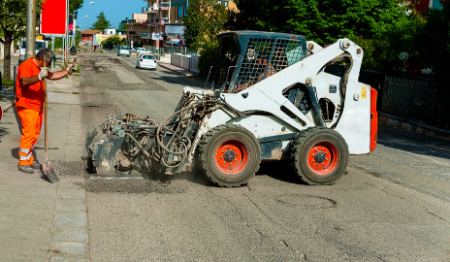Construction equipment is advancing with the advent of new technology, which gives owners and operators the tools to work as smart as possible. The technology is also rapidly changing the rental market, offering new opportunities to construction businesses.
Construction equipment technology can range from GPS systems on dozers, graders, and excavators, to hybrid power systems designed to propel the equipment into a new era of fuel economy.
“Technology plays a crucial rule in the cab by making machines and operators work more efficiently,” explains Kevin Forestell, CEO, DOZR. “There is also a big safety factor that technology affects—the knowledge operators have about their machine, the safer they can work on the job.”
This is true of both equipment that is owned and rented. Today, new rental machines offer new capabilities to improve both efficiency and safety at the construction job site.
How Technology Factors In Rentals
The benefits of renting equipment today are endless, and according to Forestell here are six key reasons:
- Avoiding long-term commitments
- Underutilization
- No maintenance or repair costs
- More job opportunities
- No equipment storage issues
- No transportation challenges
However, perhaps one of the biggest trends today is that technology can make equipment more expensive, which means renting may be a more cost-effective option for many construction companies to leverage the technology, without making a large upfront investment.
“Renting also helps operators to try out new technology they aren’t using or don’t need for every job,” explains Forestell.
Dustin Barden, global account manager, Ditch Witch, says the interesting part of renting a piece of equipment instead of owning it is the ability to try new technology as it become available.
“When renting, the competitiveness of the rental industry has driven companies to have new fleets with the newest features,” he explains. “As a rental customer, you will have the option of trying the newest models each time you rent equipment.”
He adds that by trying the features and using the latest technology when renting, an equipment operator becomes more informed should they ever decide to own that type of equipment.
Equipment continues to advance in a number of different ways. For instance, enclosed cabs continue to evolve and are increasingly more sophisticated due to new technology integrations. Many of today’s cabs feature optimized operator interfaces, including LED screens to improve visibility into machine functions and diagnostics.
Additionally, there is a greater drive to improve the environmental impact of equipment—primarily using fewer resources to keep equipment running. Other advances are often driven by the needs of the business, which can include miniaturization and creating progressive and more technologically advanced machines.
“Miniaturization is important as machines need to become more nimble and maneuverable for smaller job sites,” explains Josh Nickell, director of global strategy, Point of Rental. “Redevelopment is done in tighter quarters than new development and smaller versions of large machines are able to take care of business in places the large machines can’t. Smaller equipment is also easier to transport and use fewer resources.”
Further, he says that technology advancements in machines can take complex tasks and turn them into simple and safe ones and can take repetitive and uninteresting tasks and automate them. This ultimately frees up employees for work elsewhere on the site or can reduce the number of people needed overall.

What to Consider Before Your Next Purchase
When it comes time to make the decision to either rent or buy construction equipment, there are a number of factors that come into play. Barden of Ditch Witch explains that the most obvious difference is the financial implication of owning vs. renting equipment.
“Owning equipment comes with maintenance costs, tax implications, as well as insurance costs,” he says. “If the equipment will be used for a short-term project or infrequently, it may make sense to rent a machine and utilize your capital in other areas for growth.”
Another difference is the job flexibility of a rental unit. Construction companies will be able to find new opportunities and flexibility in jobs with the ability to rent different units instead of having one machine for every job.
“By renting equipment, you and your crew will have the ability to upsize or downsize equipment based on the need of each job site and project,” adds Barden.
For many construction companies, the decisions to rent or buy depends on the type of construction equipment that is going to be used on projects.
Barden suggests that equipment such as walk-behind trencher or mini skid steers are great to include within a rental fleet because it offers contractors the opportunity to use the machine for its niche use without having to capitalize a purchase. He adds that larger horsepower trenchers and directional drills are sometimes purchased on a rent-to-own contract, as it allows a construction company the opportunity to build equity into the purchase of a piece of equipment.
Greg Wolfe, director of training, Ditch Witch, adds that many rental operators and landscape operators are turning to mini skid steer machines for use on a variety of landscape and irrigation jobs. “Advancements in today’s units have improved maneuverability to support smaller and tighter spaces, job site visibility, and power.”
In the end, new technologies are making renting construction equipment a more appealing option—and this trend could continue to pick up steam in the years ahead.
Nickell of Point of Rental, adds “While machinery becoming more autonomous makes it easier to operate, it increases the complexity of maintenance and repair process. Letting rental companies manage maintenance reduces the need to increase the amount of training for your own mechanics and it reduces downtime when a replacement is needed.”
For construction companies, the decision to rent or buy ultimately comes down to needs on a project, but the technology is beginning to factor into the decision making process.
Join over 32,000 industry peers who receive construction industry news and trends each week. Subscribe to CONEXPO-CON/AGG 365.












